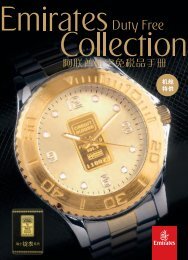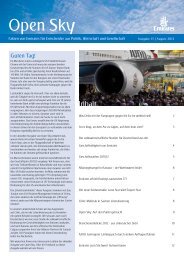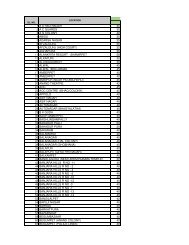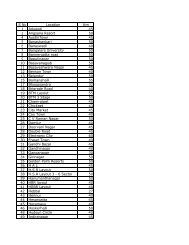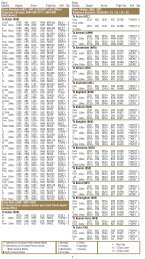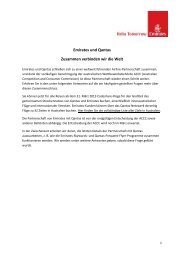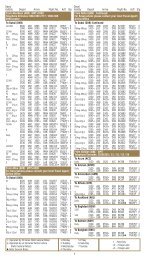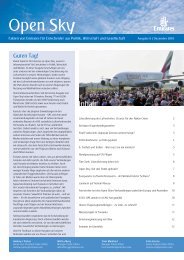Annual Report 2008-2009 - Emirates.com
Annual Report 2008-2009 - Emirates.com
Annual Report 2008-2009 - Emirates.com
Create successful ePaper yourself
Turn your PDF publications into a flip-book with our unique Google optimized e-Paper software.
<strong>Emirates</strong><br />
1. Establishment and operations<br />
076 Notes to the consolidated financial statements<br />
for the year ended 31 March <strong>2009</strong><br />
<strong>Emirates</strong> <strong>com</strong>prises <strong>Emirates</strong> and its subsidiaries. <strong>Emirates</strong> was incorporated, with limited liability, by an Emiri Decree issued by H. H.<br />
Sheikh Maktoum bin Rashid Al-Maktoum on 26 June 1985 and is wholly owned by the Investment Corporation of Dubai, a Government<br />
of Dubai entity. <strong>Emirates</strong> <strong>com</strong>menced <strong>com</strong>mercial operations on 25 October 1985 and is designated as the International Airline of the<br />
UAE.<br />
<strong>Emirates</strong> is incorporated and domiciled in Dubai, UAE. The address of its registered office is <strong>Emirates</strong> Group Headquarters, PO Box 686,<br />
Dubai, UAE.<br />
The main activities of <strong>Emirates</strong> <strong>com</strong>prise:<br />
<strong>com</strong>mercial air transportation which includes passenger, cargo and postal carriage services<br />
wholesale and retail of consumer goods<br />
in-flight and institutional catering<br />
hotel operations<br />
2. Summary of significant accounting policies<br />
A summary of the significant accounting policies, which have been applied consistently, is set out below.<br />
Basis of preparation<br />
The consolidated financial statements have been prepared in accordance with and <strong>com</strong>ply with International Financial <strong>Report</strong>ing<br />
Standards (IFRS). The consolidated financial statements are prepared under the historical cost convention except for those financial<br />
assets and financial liabilities that are measured at fair value as stated in the accounting policies below.<br />
Standards, interpretations and amendments to published standards that are not yet effective, have not been early adopted and<br />
are relevant to <strong>Emirates</strong>’ operations<br />
At the date of authorisation of these financial statements, certain new standards, interpretations and amendments to the existing<br />
standards have been published that are mandatory for accounting periods <strong>com</strong>mencing on or after 1 Jan <strong>2009</strong>. Management is<br />
currently assessing the following standards, interpretations and amendments which are likely to have an impact on <strong>Emirates</strong>’ operations:<br />
IFRS 3 (Revised), Business <strong>com</strong>binations (effective from 1 July <strong>2009</strong>)<br />
IFRS 8, Operating segments (effective from 1 January <strong>2009</strong>)<br />
IAS 1 (Revised), Presentation of financial statements (effective from 1 January <strong>2009</strong>)<br />
IAS 19 (Amendment), Employee benefits (effective from 1 January <strong>2009</strong>)<br />
IAS 27 (Revised), Consolidated and separate financial statements (effective from 1 July <strong>2009</strong>)<br />
IAS 28 (Amendment), Investments in associates (effective from 1 January <strong>2009</strong>)<br />
IAS 36 (Amendment), Impairment of assets (effective from 1 January <strong>2009</strong>)<br />
IAS 38 (Amendment), Intangible assets (effective from 1 January <strong>2009</strong>)<br />
IAS 39 (Amendment), Financial instruments (effective from 1 January <strong>2009</strong>)<br />
IFRIC 13, Customer loyalty programmes (effective from 1 July <strong>2008</strong>)<br />
Management is in the process of estimating the impact of IFRIC 13, Customer loyalty programmes (effective from 1 July <strong>2008</strong>) which will<br />
be adopted effective from 1 April <strong>2009</strong>. IFRIC 13 requires that where goods or services are sold together with a customer loyalty<br />
incentive (for example, loyalty points redeemable for future services), the arrangement is a multiple-element arrangement and the<br />
consideration receivable is allocated between the <strong>com</strong>ponents of the arrangement using fair values. Therefore, the accounting policy for<br />
<strong>Emirates</strong> frequent flyer programme will be changed to a deferred revenue model effective 1 April <strong>2009</strong>, with revenue being recognised<br />
when loyalty points are redeemed and <strong>Emirates</strong> fulfils its obligations to provide goods or services. Frequent flyer miles are currently<br />
accounted on an incremental direct cost basis as a provision and an operating expense, while revenue from miles accrued through<br />
utilising the services of programme partners is recorded as other operating in<strong>com</strong>e. In line with the guidance provided in IAS 8, the<br />
change in the accounting policy will be applied retrospectively.<br />
Basis of consolidation<br />
Subsidiaries are those entities (including special purpose entities) in which <strong>Emirates</strong> has the power to govern the entity’s operating and<br />
financial policies generally ac<strong>com</strong>panying a shareholding of more than one half of the voting rights. Subsidiaries are consolidated from the<br />
date on which control is transferred to <strong>Emirates</strong> and are de-consolidated from the date that control ceases. Inter-<strong>com</strong>pany transactions,<br />
balances and unrealised gains and losses arising on transactions between <strong>Emirates</strong> and its subsidiaries are eliminated.





